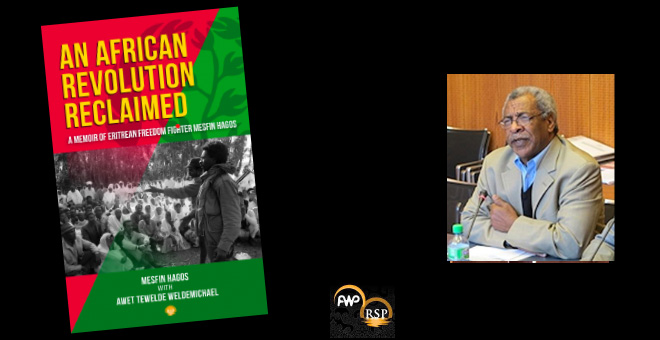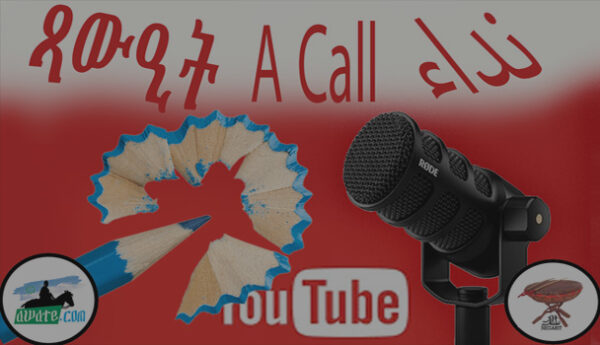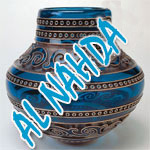Book Review: An African Revolution Reclaimed

Book Reviewer: Semere T HabtemariamTittle: An African Revolution Reclaimed: A Memoir of Eritrean Freedom Fighter Mesfin Hagos
Author(s): Mesfin Hagos and Awet Tewelde Weldemichael
Publisher: Red Sea Press
Year: 2023
Pages: 436
First impression is the best impression:
For the last two decades, the idea of writing a memoir has been a constant theme in my conversations with both Mesfin Hagos and the late Adhanom Ghebremariam. Both are excellent writers with an impeccable command of the Tigrinya language. To the chagrin of others and myself, both decided to kick the can down the road. Sadly, it is too late for the latter, but I am glad that Mesfin has finally been able to grace us with his much anticipated and needed book. And what a gift it has turned out to be; it is worth the long wait. He has earned the right to look like the cat that ate the canary.
The first time I met Mesfin Hagos was in 2002 when he came to give a seminar in my hometown. Soon after, I vividly rememberreceiving a call from Dr. Bereket Habte Selassie, who wanted to know how the meeting was and what my observations were on Mesfin. Without any hesitation and forethought, I quickly responded that he seemed to be a “colossus of integrity,” and the good professor retorted, “you got it.”
Mesfin did not pander to the audience who were mostly former ELF members (I was too young to be a member during ELF’s heyday, but I do have ጀብሃ جبهه pedigree); although doing so might have been more expeditious to garner their support. The members of the organization that Mesfin co-founded, the EPLF/PFDJ, were demonizing and ostracizing him, and his comrades in exile and him were at the lowest point in their lives. They were isolated, dejected, and destitute, and could havedesperately used all the help they could get. Most people, in his situation, would have opted for expediency over principle, but Mesfin is not like a dime a dozen politician. He does not peddle in the perversion of his own principles and is not afraid to ruffle feathers. Mesfin had the courage to be true to himself; he spoke his truth in simple, plain, and clear terms. No ifs, ands, or buts about it. Just straight talk.
He is a maverick.
The years since then have only confirmed my first impression ofMesfin. He is easy to respect but it takes more time to like him; he is an acquired taste. He is a man of honor, a man of principles, and a man of unrivaled integrity. His self-control and discipline are unmatched by any of his peers and whether he is right or wrong, one could easily rely on his consistency and his proclivity to speak truth. There were few occasions in the last two decades where I thought Mesfin was wrong on his political decisions and judgements, but I have never heard his lips utter lies. He is steady as a rock.
His stellar record in the history of our armed struggle is a testimony to his own personal ingenuity as much as it is to the galaxy of leaders who led the EPLF, and to the shared sacrifices of all the brave men and women who put themselves on harm’s way.
Here is how Mesfin puts it:
“My growth and learning increased exponentially in the EPLF, an organization that I helped found, strengthen, and lead to victory. It was one of the most formidable organizations of the modern era, whose senior ranks embraced individuals from illiterate or barely literate peasants to Harvard-educated, first-rate intellectuals. I belong to a generation that, with all its shortfalls, believed in a cause bigger than the sum total of our individual selves, a generation that shirked no sacrifices in pursuit of its cause. I am proud of our accomplishments and do not shy away from taking responsibility for our failings.” (Pg. 389) “Our shortfalls include our inability to liberate our country from poverty, repression, and tyranny and usher our people into an era of peace, freedom and prosperity.” (Pg. 390)
The EPLF accomplished a mission that was thought to beimpossible by many. “Liberating our country is one major accomplishment of which we as people must be proud.” (Pg. 352)
The triumphant conclusion of our armed struggle is the only nation-wide and all-inclusive shared experience that has boosted and could even further boost our national self-confidence and can-do attitude.
The fact that the bell of liberty is not ringing is not a good excuse to mess with our hard-earned independence.
Mesfin acknowledges fairly and accurately that “administering the country and managing its external affairs…is a dauntingly complex task in which our record has been abysmal.” (Pg. 352)
Surely, our disappointments are running deep, and our frustrations are hot and heavy, but it is not reason enough or prudent enough to cast doubt on our independence or shake its very foundation.
ንሓዋሩ ዝኾነካ መሰረት ኣይትነቕንቕ (Do not shake a foundation that could serve you for eternity.)
We need to cherish, preserve, and protect our hard-won independence while fighting harder for our rights and liberties. “If our past experience is any indication, we, as a people, are capable of overcoming the current challenges and achieving our goals.” (Pg. 396)
Those who underestimate Mesfin do so at their own peril:
People could easily underestimate this diamond in the rough, but they do so at their own peril. His simple and an unassuming personality, although refreshing, could be misleading. His still waters run deep. He is one of the most thoughtful and astute observers of the human condition and human nature.
Every interaction I have had with Mesfin over the years have nudged me to think about things Eritrean in a much deeper and meaningful way.
“An African Revolution Reclaimed” is an elaboration of the long-running conversation I have had with Mesfin. I did not find any discrepancy between what he had kindly and privately shared with me over the years and with what he is publicly sharing in his book now.
This is the hallmark of integrity; Mesfin’s personality is whole and intact.
He had made the most out of his unenviable circumstances and at the heart of his stardom lies his affinity for knowledge and his unflinching commitment to continual learning.
The man is an avid reader.
When I read the story of his childhood in chapter one, I could easily see his personality unfolding in front of me. No wonderwe call them “formative years.”
The beginning of wisdom is silence:
It looked like Mesfin discovered early on, through necessity and not curiosity, the secret of learning. Mesfin embodies theEgyptians saying, “Listen and you would be wise. The beginning of wisdom is silence.”
During his most trying moments in Sahel, Mesfin managed to carve out some time and seek solace in solitude by going on retreats. He had made silence the source of his mystery and that, in turn, had made him an intriguing and enthralling character.
His actions, however, never failed to amaze people, and it is the sole source of his popularity among the EPLF’s ordinary members. It is the reason that Mesfin was able to garner the second highest votes in the third EPLF organizational congress in 1994.
Despite the back room wheeling and dealing of the clandestine party against Mesfin, orchestrated by no other than Isaias himself, he came smelling like a rose. It was a tribute to his record of service and contribution.
He felt vindicated.
No Vendetta:
The book is neither written to settle scores with those who did Mesfin harm nor to make him into a hero. Mesfin knows the adage that “man is guilty for all the good he has not done.”
The tragedy that has befallen Eritrea is the fault of all of us. We all failed to build the intellectual, moral, political, cultural, and institutional ramparts to keep tyranny at bay, and safeguard our hard-earned freedom. It is the tragedy of a biblical proportion and the reason which has kept Mesfin and the rest of us awake at night.
Eritrea has become the poster child of a people who paid so much for so little. So much is wrong with today’s Eritrea. We have an aging leadership that had lost its luster and is badlylagging even by African standards. It is a leadership that has a hammer as its only tool and sees every problem as a nail. Brute force or violence is the only way to solve domestic and regional problems in Eritrea. After three decades of atrophy, Eritrea has fully succumbed to militarism and intellectual sterility.
I am going to refrain from writing that the regime must go. I am eerily reminding myself of a quote attributed to President Richard Nixon: the reason I do not tell people “Go to hell” is because I cannot ensure that they get there.
Our story too:
“An African Revolution Reclaimed” is Mesfin’s story as it is the EPLF’s. It is Mesfin’s story as it is the story of all of us. It is the story of modern Eritrea, its highs and lows, its ebbs and flows, its trials and tribulations, its glories and shame, and its triumphand disaster.
It is written to inform as much as it is to edify us. It encapsulatesthe ancient wisdom of “ዝወዓለ ይንገርካ ዝተጋገየ ይምዓድካ” (May you be informed by one who has been there and advised by one who had erred before.) These are the two yardsticks by which I am measuring the importance of Mesfin’s book.
Before I delve into the narrative and the lessons learned, it is only right that I say a few words about the book and its structure.
A blend of Biograph, autobiography, and Memoir:
“An African Revolution Reclaimed” is neither a scholarly nor an academic work, and, as such, it has no citations. It is an aberration from the norm, and it defies easy classification. It is a strange blend of an autobiography, biography, and a memoir.
It identifies itself as a memoir, but it has two authors: Mesfin and Awet.
The most important feature in a memoir is the author’s authenticity, the voice. It is the main source of trust and credibility. This raises a fundamental question of whose voice are we listening: Mesfin or Awet?
There is no published book which has not hugely benefited fromfriends-helping-friends, literary agents, editors, and translators. I think Mesfin could have dedicated a page in his preface to profusely thank Awet for his necessary and essential contribution, and that would have sufficed. He could have alsowritten it in Tigrinya and have Awet translate it into English. This could have easily blotted out any appearance of undue influence.
The book has nine chapters with an introduction and a conclusion. Each chapter focuses on an important stage in the author’s life or major events that have turned out to be very consequential in the history of Mesfin, the EPLF, and Eritrea.
There is a logical progression and coherence to the chapters and the narration flows beautifully. It is truly very engaging. The elegance of the author’s storytelling is only matched by the importance of the lessons the book imparts.
From the moment I started reading the book, it had me totally engrossed in its world.
iessons learned
Both the ELF and EPLF inculcated the readiness for self-sacrifice and united action, but the EPLF seemed to take it a notch higher by demanding from its members singlehearted loyalty and faith. The organizational discipline, the intolerance for dissension, enthusiasm for action, and the hatred towards the enemy—domestic and foreign—made the EPLF a highly effective and efficient military organization.
Although it was the underdog in the first few years after its formation, the unrivalled cohesion and esprit de corps of its members enabled it to emerge as the big dog that eventually drove the ELF into exile and Ethiopia out of the country.
The EPLF since its inception exhibited all the essential characteristics of successful movements—irrespective if they were good or bad. The Nazis and the communists had it. The Christians and the Muslims had it and so did the EPLF. The readiness for self-sacrifice, the demand for united action, and commitment to put the organization ahead of yourself and others. Nothing matters but the organization and everything should be sacrificed for the organization—including one’s life, friends’ lives, and families. ግምባር ኣለኒ ዕድል ኣልኒ ናብህዝባዊ ግንባር ዘሰለፈኒ.
It is this recognition that is making Mesfin Hago, even today,say, “A united struggle is not a choice, it is necessity now.” (Pg. 395)
He is right, but we must ensure that we can finally temper it with wisdom. It means that we must have the Mesfins who could defy Isaias—not one time, not some time, but every single time. We need all the ramparts I mentioned above to help us secure our freedoms.
“The challenge of our time is to devise mechanisms and frameworks of resistance that, upon their victory, guarantee that the post Isaias political dispensation in Eritrea is inclusive, fair, equitable, and rules based.” (Pg. 395)
One simple and practical way that could help us is to not let founders like Isaias rule in perpetuity. We need the Pauls and Omer Ibn Al Khattabs of the world to take us to the next step.Isaias has made it clear that he is not interested in being a former president. It is time he gets his wish. I am ready to call him the late president.
“Isaias Afwerki remains at the heart of our malady as a nation. He is the malady, and an incurable one at that.” (Pg. 391)
What is true for the individual is true for an organization:
If individuals form their character in the formative years, so do organizations. To understand the genesis of tyranny in Eritrea, we must go back and investigate the early years of the EPLF. The way the EPLF managed or mishandled its earliest crisis is the way it is managing crisis today. Harassment and intimidation, extortion and ostracization, torture and disappearances, and imprisonment and liquidation.
Nothing has changed except the scope and magnitude of our suffering.
Isaias Afwerki has always been the spoiled brat of the EPLF.
Although the law required Isaias Afwerki, if elected to be the secretary general of the party, to be also the secretary general ofthe front, he refused to accept the latter role. Instead, he put there a weakling for a public façade and gave himself a carte blanche to do whatever he pleased.
He always had his way; he was above the law.
Reading Mesfin’s book, I finally understood why so many EPLF/PFDJ’s members are still loyal to him. The Isaias they liked as the secretary general of the EPLF is the same Isaias who is now the president of Eritrea.
The logic, although wrong and not well-articulated, is nonetheless, valid: if Isaias was above the law in Sahel, why cannot he be above the law in Asmera.
Hard to swallow that the ELF was the main culprit in the decade old civil war:
Mesfin’s book has touched upon all the major events that have affected and are still affecting our lives today. He has offered insights that demonstrate a profound understanding of history and what we can do to move forward.
Throughout the book, I felt Mesfin Hagos was a credible and trustworthy narrator, but there was one thing that was not easy for me to swallow. Commonsense tells me that in any conflict, it always takes two to tango and it is extremely rare where both parties are not guilty. One party could have the lion’s share of the faults, but I doubt if the other would be blameless.
Reading Mesfin’s book, I got the impression that the ELF was always responsible for the decade-long and intermittent civil war.
I am not in any position to dispute his facts; I am just expressing the difficulty I had trying to digest it.
After reading the book, I had the occasion to discuss this point with Mesfin. True to his character, he stands behind what he has written and made it clear that he is willing and ready to discuss and debate this if I can find serious and responsible people with firsthand knowledge.
I wholeheartedly recommend this book:
This is a powerful addition to the existing literature and has helped me narrow the vexing gaps I had in my knowledge and understanding. It is my hope that so many of us will have the opportunity to read this valuable book. It would make you a better citizen.
“We are citizens and we have toiled for the freedom and liberation of our people, and we continue to do so because we too are stakeholders.” (Pg. 396).
As excellent as this book is, it could have been enhanced if the names of places were written, in parenthesis, in Tigrinya or Arabic. The Latin rendition makes it harder to decipher the meaning of the names and relate to them.
The book could be purchased at Red Sea Press




Awate Forum